
Damon Francis Knight was an American science fiction author, editor, and critic. He is the author of "To Serve Man", a 1950 short story adapted for The Twilight Zone. He was married to fellow writer Kate Wilhelm.

The Moon Is a Harsh Mistress is a 1966 science fiction novel by American writer Robert A. Heinlein about a lunar colony's revolt against absentee rule from Earth. The novel illustrates and discusses libertarian ideals. It is respected for its credible presentation of a comprehensively imagined future human society on both the Earth and the Moon.

The Green Hills of Earth is a collection of science fiction short stories by American writer Robert A. Heinlein, published in 1951, including short stories published as early as 1941. The stories are part of Heinlein's Future History. The title story is the tale of an old space mariner reflecting upon his planet of birth. According to an acknowledgement at the beginning of the book, the phrase "the green hills of Earth" is derived from a story by C. L. Moore.

Orphans of the Sky is a science fiction novel by American writer Robert A. Heinlein (1907–1988), consisting of two parts: "Universe" and its sequel, "Common Sense". The two novellas were first published together in book form in 1963. "Universe" was also published separately in 1951 as a 10¢ Dell paperback. The work presents one of the earliest fictional depictions of a generation ship.
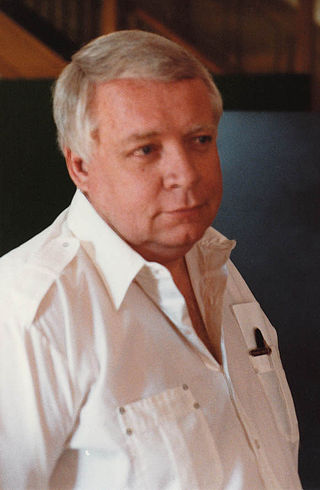
Algirdas Jonas "Algis" Budrys was a Lithuanian-American science fiction author, editor and critic. He was also known under the pen names Frank Mason, Alger Rome in collaboration with Jerome Bixby, John A. Sentry, William Scarff and Paul Janvier. In 1960 he wrote Rogue Moon, a novel. In the 1990s he was the publisher and editor of the science-fiction magazine Tomorrow Speculative Fiction.
Alexei Panshin was an American writer and science fiction critic. He wrote several critical works and several novels, including the 1968 Nebula Award–winning novel Rite of Passage and, with his wife Cory Panshin, the 1990 Hugo Award–winning study of science fiction The World Beyond the Hill.

Sam Moskowitz was an American writer, critic, and historian of science fiction.
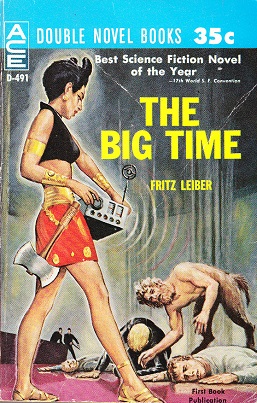
The Big Time is a short science fiction novel by American writer Fritz Leiber. Awarded the Hugo Award for Best Novel or Novelette in 1958, The Big Time was published originally in two parts in Galaxy Magazine's March and April 1958 issues, illustrated by Virgil Finlay. It was subsequently reprinted in book form several times. The Big Time is a story involving only a few characters, but with a vast, cosmic backstory.

"Marooned off Vesta" is a science fiction short story by American writer Isaac Asimov. It was the third story he wrote, and the first to be published. Written in July 1938 when Asimov was 18, it was rejected by Astounding Science Fiction in August, then accepted in October by Amazing Stories, appearing in the March 1939 issue. Asimov first included it in his 1968 story collection Asimov's Mysteries, and subsequently in the 1973 collection The Best of Isaac Asimov.

Time and Stars is a collection of science fiction short stories by American writer Poul Anderson, published in 1964.
The Golden Age of Science Fiction, often identified in the United States as the years 1938–1946, was a period in which a number of foundational works of science fiction literature appeared. In the history of science fiction, the Golden Age follows the "pulp era" of the 1920s and '30s, and precedes New Wave science fiction of the '60s and '70s. The 1950s are, in this scheme, a transitional period. Robert Silverberg, who came of age then, saw the '50s as the true Golden Age.
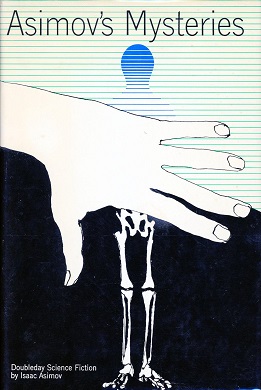
Asimov's Mysteries, published in 1968, is a collection of 14 short stories by American writer Isaac Asimov, almost all of them science fiction mysteries. The stories were all originally published in magazines between 1954 and 1967, except for "Marooned off Vesta", Asimov's first published story, which first appeared in 1939.
Thomas L. Sherred was an American science fiction writer.
The science fiction writer Robert A. Heinlein (1907–1988) was productive during a writing career that spanned the last 49 years of his life; the Robert A. Heinlein bibliography includes 32 novels, 59 short stories and 16 collections published during his life. Four films, two TV series, several episodes of a radio series, at least two songs and a board game derive more or less directly from his work. He wrote the screenplay for Destination Moon (1950). Heinlein also edited an anthology of other writers' science fiction short stories.
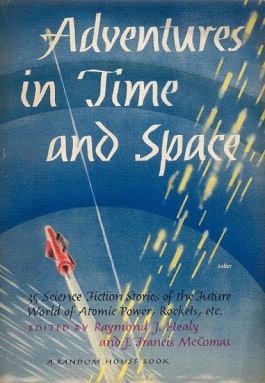
Adventures in Time and Space is an American anthology of science fiction stories edited by Raymond J. Healy and J. Francis McComas and published in 1946 by Random House. A second edition was also published in 1946 that eliminated the last five stories. A Modern Library edition was issued in 1957. When it was re-released in 1975 by Ballantine Books, Analog book reviewer Lester del Rey referred to it as a book he often gave to people in order to turn them onto the genre. It is now once again out of print.
There have been many attempts at defining science fiction. This is a list of definitions that have been offered by authors, editors, critics and fans over the years since science fiction became a genre. Definitions of related terms such as "science fantasy", "speculative fiction", and "fabulation" are included where they are intended as definitions of aspects of science fiction or because they illuminate related definitions—see e.g. Robert Scholes's definitions of "fabulation" and "structural fabulation" below. Some definitions of sub-types of science fiction are included, too; for example see David Ketterer's definition of "philosophically-oriented science fiction". In addition, some definitions are included that define, for example, a science fiction story, rather than science fiction itself, since these also illuminate an underlying definition of science fiction.
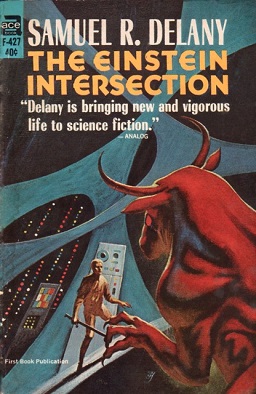
The Einstein Intersection is a 1967 science fiction novel by Samuel R. Delany. The title is a reference to Einstein's Theory of Relativity connecting to Kurt Gödel's Constructible universe, which is an analogy to science meeting philosophy. The original publisher, Ace Books, changed Delany's originally intended title from A Fabulous, Formless Darkness for commercial reasons.

The Watch Below (1966) is a science fiction novel by British writer James White about a colony of humans stranded underwater in a sunken ship, who survive by air pockets, and a water-breathing alien species in search of a new home. The two generation ships encounter each other in the Earth's ocean.

Seekers of Tomorrow: Masters of Modern Science Fiction is a work of collective biography on the formative authors of the science fiction genre by Sam Moskowitz, first published in hardcover by the World Publishing Company in 1965. The first paperback edition was issued by Ballantine Books in October, 1967. A photographic reprint of the original edition was issued in both hardcover and trade paperback by Hyperion Press in 1974. Most of its chapters are revised versions of articles that initially appeared in the magazine Amazing Stories from 1961 to 1964.
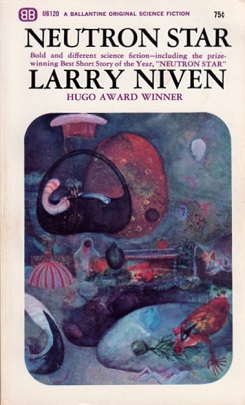
Neutron Star is a collection of science fiction short stories by American writer Larry Niven, published in April 1968. The individual stories were published in If and Galaxy Science Fiction in 1966–1967, under Frederik Pohl as editor.














